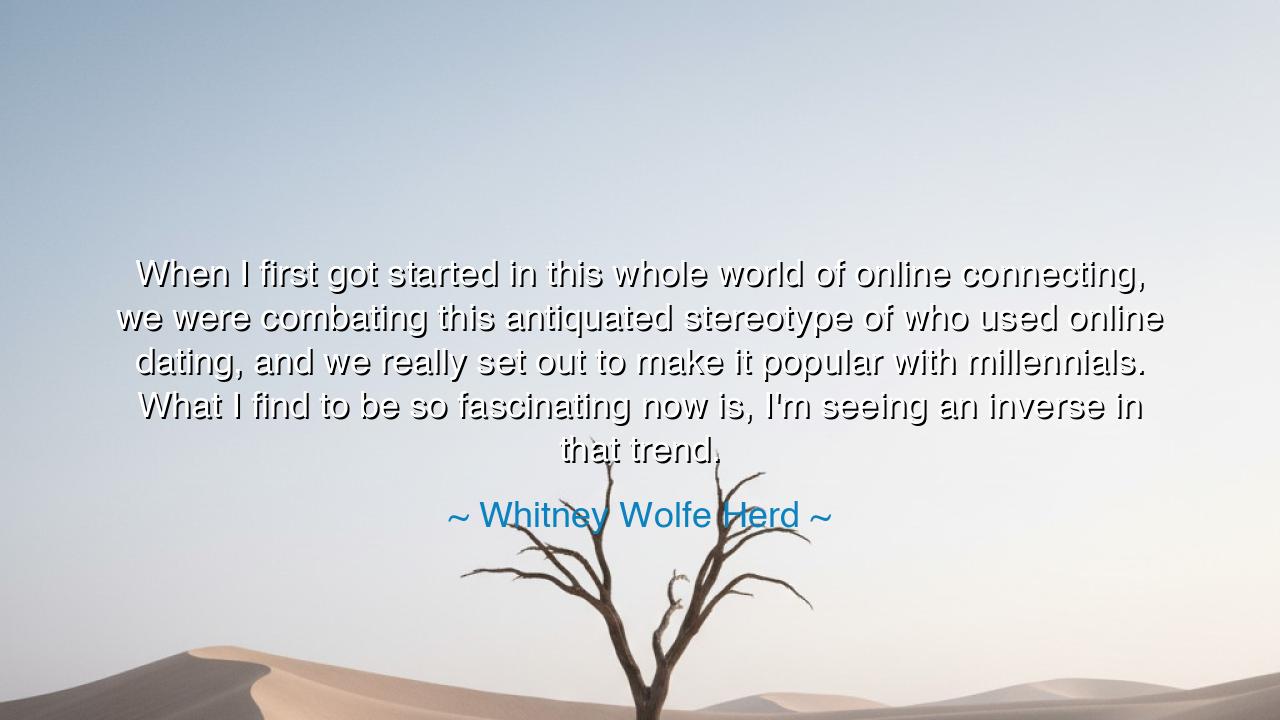
When I first got started in this whole world of online
When I first got started in this whole world of online connecting, we were combating this antiquated stereotype of who used online dating, and we really set out to make it popular with millennials. What I find to be so fascinating now is, I'm seeing an inverse in that trend.






In the words of Whitney Wolfe Herd, the founder who reshaped the very landscape of human connection, we hear both reflection and revelation: “When I first got started in this whole world of online connecting, we were combating this antiquated stereotype of who used online dating, and we really set out to make it popular with millennials. What I find to be so fascinating now is, I'm seeing an inverse in that trend.” Within this statement lies not just the story of an industry, but a timeless meditation on change, perception, and the cycles through which human culture evolves. It is a tale as ancient as invention itself — the struggle between the old and the new, the familiar and the emerging, the eternal dance between innovation and tradition.
In the beginning, Wolfe Herd and her peers stood as rebels against stigma, facing the skepticism that always greets the birth of new ideas. The “antiquated stereotype” she speaks of was the belief that digital love was artificial, that technology had no place in the realm of the heart. Yet this is the same doubt that the ancients cast upon every great innovation. When Socrates warned that writing would destroy memory, he could not foresee how it would preserve the wisdom of centuries. So too did many believe that meeting a lover through a screen was a betrayal of romance — not realizing that the heart, in every age, seeks new languages to express its longing. Wolfe Herd’s mission was not merely to build an app, but to reshape the story of modern connection, to show that technology could amplify humanity rather than diminish it.
And so, through courage and vision, she made what was once shameful into something celebrated. She and her generation turned online dating from secrecy into social norm, giving it the glow of modern confidence and youthful energy. But in her words, “I’m seeing an inverse in that trend,” we find the profound recognition that progress itself is cyclical — that the same forces which elevate an idea will, in time, reshape it again. Now that online connection has become universal, it has lost its edge of novelty. The young seek again what the old once cherished: authenticity, slowness, the touch of the real. This is no failure, but a sign of the eternal rhythm of human desire — a pendulum that swings endlessly between discovery and return.
Consider the story of Prometheus, who stole fire from the gods and gave it to humanity. At first, the gift was seen as heresy, an act of rebellion against divine order. Yet it became the foundation of civilization — warmth, light, creation. Over time, however, the same fire was misused, leading to destruction and war. Humanity learned, as it always does, that every innovation carries both illumination and shadow. Wolfe Herd’s reflection follows this ancient truth: the tools we create to connect us can also divide us if we forget their purpose. The “inverse trend” she observes is not decay, but awakening — the soul remembering that technology must serve heart, not the other way around.
Her words, then, are not nostalgic, but wise. They remind us that progress without reflection leads to emptiness, and that every generation must reclaim meaning from the tools it inherits. Just as she once fought to normalize digital love, so now she watches as a new generation seeks to rediscover the intimacy behind the interface — to feel once more the pulse of connection that no algorithm can fully replicate. The ancients knew this paradox well: that the more we reach outward through invention, the more we must turn inward to preserve our humanity.
The lesson here is both timeless and urgent: embrace innovation, but do not worship it. Use the tools of the age to expand your world, but never let them replace your essence. Let technology serve your soul, not shape it. When a culture grows too enamored with its inventions, it risks losing the very tenderness those inventions were meant to protect. Wolfe Herd’s journey — from dismantling stereotypes to witnessing new ones rise — teaches that wisdom lies not in clinging to either old or new, but in holding both in balance, as day holds night.
And so, let this reflection be passed to those who will inherit the digital kingdoms of the future: remember always that connection is sacred. Whether through words etched on parchment or messages sent through light, what matters is not the medium, but the authenticity of the heart that sends it. Whitney Wolfe Herd, in her quiet observation of cycles, reminds us that the future belongs not to those who chase trends, but to those who understand the soul behind them. The wise will see in her words the eternal truth — that every generation must rediscover what it means to be human, again and again, through the tools it creates.






AAdministratorAdministrator
Welcome, honored guests. Please leave a comment, we will respond soon